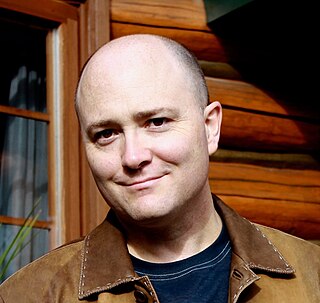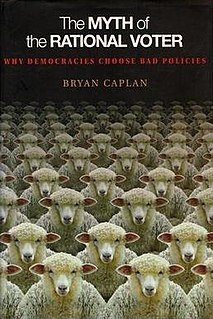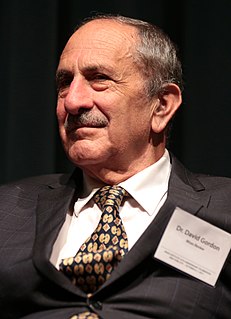
The Machinery of Freedom is a nonfiction book by David D. Friedman which advocates an anarcho-capitalist society from a utilitarian/consequentialist perspective.

The Libertarian Party (LP) is a political party in the United States that promotes civil liberties, non-interventionism, laissez-faire capitalism, and limiting the size and scope of government. The party was conceived in August 1971 at meetings in the home of David F. Nolan in Westminster, Colorado, and was officially formed on December 11, 1971 in Colorado Springs, Colorado. The founding of the party was prompted in part due to concerns about the Nixon administration, the Vietnam War, conscription, and the introduction of fiat money.

Joseph Neil Schulman was an American novelist who wrote Alongside Night and The Rainbow Cadenza which both received the Prometheus Award, a libertarian science fiction award. His third novel, Escape from Heaven, was also a finalist for the 2002 Prometheus Award. His fourth and last novel, The Fractal Man, was a finalist for the 2019 Prometheus Award.
Libertarians have differing opinions on the validity of intellectual property.
Libertarians promote individual liberty and seek to minimize the role of the state. The abortion debate is mainly within right-libertarianism between cultural liberals and cultural conservatives as left-libertarians generally see it as a non-issue as they support legal access to abortion as part of their general support for individual rights, especially in regard to what they consider to be a woman's right to control her body. Religious right and intellectual conservatives have attacked such libertarians for supporting abortion rights, especially since the demise of the Soviet Union. Libertarian conservatives claim libertarian principles such as the non-aggression principle apply to human beings from conception and that the universal right to life applies to fetuses in the womb. Thus, some of those individuals express opposition to legal abortion.

Bryan Douglas Caplan is an American economist and author. Caplan is a professor of economics at George Mason University, research fellow at the Mercatus Center, adjunct scholar at the Cato Institute, and frequent contributor to Freakonomics as well as publishing his own blog, EconLog. He is a self-described economic libertarian. The bulk of Caplan's academic work is in behavioral economics and public economics, especially public choice theory.

Hans-Hermann Hoppe is a German-born American Austrian School economist, and paleolibertarian anarcho-capitalist philosopher. He is Professor Emeritus of Economics at the University of Nevada, Las Vegas (UNLV), Senior Fellow of the Ludwig von Mises Institute, former Editor of the Journal of Libertarian Studies, a lifetime member of the Royal Horticultural Society and the founder and president of the Property and Freedom Society.
Libertarian theories of law build upon classical liberal and individualist doctrines.

The Nolan Chart is a political spectrum diagram created by American libertarian activist David Nolan in 1969. The chart charts political views along two axes, representing economic freedom and personal freedom. It expands political view analysis beyond the traditional one-dimensional left–right/progressive-conservative divide, in order to position libertarianism as outside the traditional spectrum.
George Hamilton Smith is an American author, editor, educator and speaker, known for his writings on atheism and libertarianism.
The non-aggression principle (NAP), also called the non-aggression axiom, the anti-coercion, zero aggression principle, or non-initiation of force, is an ethical stance asserting that aggression is inherently wrong. In this context, aggression is defined as initiating or threatening any forceful interference with an individual or their property. In contrast to pacifism, it does not forbid forceful defense.

Norman Stephan Kinsella is an American intellectual property lawyer, author, and deontological anarcho-capitalist. His legal works have been published by Oceana Publications and are stored on the Westlaw database.
David Conway is a British academic philosopher who has written several books on philosophy and politics. He has been described as "a classical liberal who thinks nations are essential".
Frank Van Dun is a Belgian law philosopher and libertarian natural law theorist. He is associated with the law faculty of the University of Ghent.

Right-libertarianism, also known as libertarian capitalism or right-wing libertarianism, is a political philosophy and type of libertarianism that strongly supports capitalist property rights and defends market distribution of natural resources and private property. Like most forms of libertarianism, it tends to support civil liberties, but also natural law, negative rights and a major reversal of the modern welfare state. Right-libertarianism is contrasted with left-libertarianism, a type of libertarianism that combines self-ownership with an egalitarian approach to natural resources. In contrast to socialist libertarianism, it tends to support free-market capitalism. Like libertarians of all varieties, right-libertarians refer to themselves simply as "libertarians". This is done to distinguish libertarian views on the nature of property and capital, usually along left–right or socialist–capitalist lines.

The Myth of the Rational Voter: Why Democracies Choose Bad Policies is a 2007 book by the economist Bryan Caplan, in which the author challenges the idea that voters are reasonable people whom society can trust to make laws. Rather, Caplan contends that voters are irrational in the political sphere and have systematically biased ideas concerning economics.

Walter Edward Block is an American Austrian School economist and anarcho-capitalist theorist. He currently holds the Harold E. Wirth Eminent Scholar Endowed Chair in Economics at the J. A. Butt School of Business at Loyola University New Orleans, and is a senior fellow of the Ludwig von Mises Institute in Auburn, Alabama. He is best known for his 1976 book Defending the Undefendable, which takes contrarian positions in defending acts which are illegal or disreputable but Block argues are actually victimless crimes or benefit the public.

Floyd Arthur "Baldy" Harper was an American academic, economist and writer who was best known for founding the Institute for Humane Studies in 1961.

David Gordon is an American libertarian philosopher and intellectual historian influenced by Rothbardian views of economics. Peter J. Boettke, in his Reason Foundation "Reason Papers," Issue No. 19, Fall 1994, describes Gordon as "a philosopher and intellectual historian who is deeply influenced by the Rothbardian strand of economics." He is a senior fellow at the Ludwig von Mises Institute and editor of The Mises Review.
Argumentation ethics is a proposed proof of the libertarian private property ethic developed in 1988 by Hans-Hermann Hoppe, a Professor Emeritus with the University of Nevada, Las Vegas College of Business and Ludwig von Mises Institute Senior Fellow. Responses have mainly come from Hoppe's colleagues at the Mises Institute, among whom the argument's reception has been mixed.












